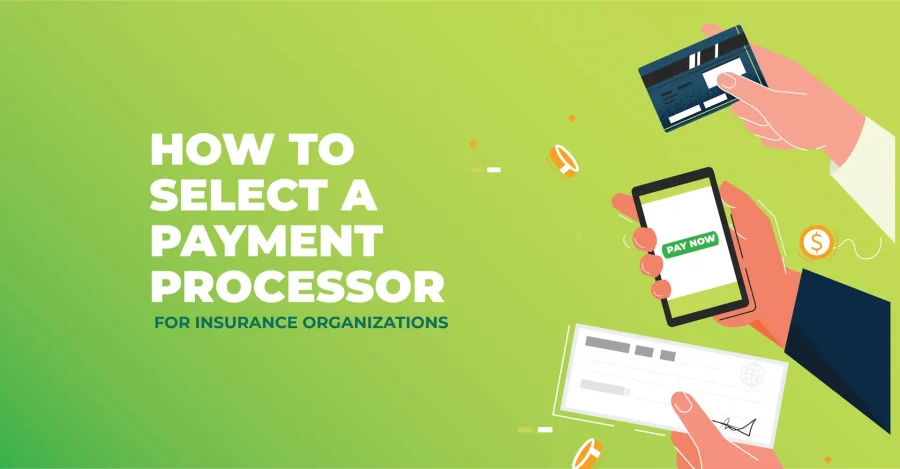Historically perceived as lagging behind in adopting modern technologies, many insurance companies are now catching up, modernizing their tools and payment processes. Change is accelerating around us, and for insurance, selecting the right tools to manage their business is not just an option; it’s a necessity for continued success in today’s dynamic landscape. The selection of a payment processor is a critical decision that directly impacts the efficiency, security, and overall success of a business.
Let’s delve into key criteria insurance companies should consider when selecting a payment processor and why (we believe) opting for a provider tailored to the insurance market is essential.
User Interface (UI) and User Experience (UX)
Insurance companies should prioritize payment processors that offer a user-friendly interface for both customers and internal staff. A well-designed UI enhances customer satisfaction and reduces the likelihood of errors during payment processing. It also makes sure that payers understand your new process and can easily submit payments online on the first try. The UI of your payment page should also align with your own branding to foster a sense of trust and certainty that the payer is in the right place.
Using an insurance-specific payment processor aids in the streamlining of processes for your team. If the payer is able to input invoice/account number, include notes, and select policies pulled directly from your management system, it will make your teams’ job much easier when it comes to tracking and managing payments.
Payment Types and Flexibility
Insurance companies operate in a diverse market with varied customer preferences. It is essential to choose a payment processor that supports a wide range of payment types, including credit/debit cards, ACH transfers, and checks. The four major credit card vendors are Mastercard, Visa, American Express, and Discover. When choosing a payment processor, make sure they take payments from all of these.
Recent inflation-driven economic changes have also underscored the value PFCs bring to their insurance payments ecosystem. Many consumers and businesses have noticed their monthly insurance payments going up. Because of this, it has become imperative to offer financing options to clients. The perfect scenario is your PFC partnering with your payment processor, like ePayPolicy’s newest feature, Finance Connect.
Authorization Approvals
Efficient authorization approval processes are critical for insurance companies to minimize delays in policy issuance and claims processing. The chosen payment processor should offer swift and reliable authorization approvals, reducing the risk of declined transactions and ensuring a seamless customer experience. Advanced fraud detection mechanisms and real-time authorization checks contribute to enhanced security while maintaining operational efficiency.
When choosing digital payments over checks, companies want the speed that comes with online payments. Ask payment processors how long it takes for payments to clear, and know that the answers will vary from credit cards to ACH and check lockboxes.
Cost Optimization
Cost considerations are paramount for insurance companies when selecting a payment processor. It is crucial to evaluate the fee structure, including transaction fees, monthly subscription costs, and any additional charges. While cost optimization is essential, it is equally important to assess the overall value provided by the payment processor, considering factors such as security features, customer support, and scalability. The needs of insurance companies vary and depend on their size, offerings, and clientele.
Some payment processors, like ePayPolicy, allow companies to pass transaction fees to insureds, either wholly or partly. This works because the payment processor is passing the fee, not you, the insurance company. A transparent fee structure allows insurance companies to manage their budget effectively and avoid unexpected expenses.
Integrations with Core Systems
Insurance companies rely on a variety of core systems for policy management, claims processing, and other essential functions. Seamless integration between the payment processor and these core systems, especially your AMS, is a big plus when it comes to operational efficiency. The chosen payment processor should offer robust integration capabilities, allowing for a unified and automated workflow. Integration eliminates manual data entry, reduces errors, and accelerates overall processing times.
PCI Compliance
Payment Card Industry Data Security Standard (PCI DSS) compliance is non-negotiable when it comes to handling sensitive financial information. Insurance companies must prioritize payment processors that adhere to PCI standards to ensure the security of customer data. Compliance with these standards safeguards against data breaches and instills trust among customers regarding the confidentiality and integrity of their payment information.
Why Generic Payment Processors Fall Short
While generic payment processors may seem like a convenient option at first glance, they often lack the industry-specific features and insights that insurance companies require. Payment processors specializing in the insurance market understand the unique challenges and regulatory requirements of the industry. They offer tailored solutions that cater to the specific needs of insurance businesses, such as automated reconciliation of premium payments and seamless integration with agency management systems.
As insurance companies, it’s important to not only collect payments, but also send funds to partners like carriers. It’s also important to request policy information on the payment page, and to automatically update management systems when payments go through.
Selecting the right payment processor is a strategic decision that directly influences the success of insurance companies in today’s digital landscape. By prioritizing criteria such as user interface, payment versatility, authorization approvals, cost optimization, integrations, and PCI compliance, insurance businesses can ensure a seamless and secure payment experience for their customers. Moreover, opting for a payment provider specializing in the insurance market offers tailored solutions that go beyond generic processing, ultimately reducing manual labor and streamlining accounting processes for increased operational efficiency.
- Steve Millerhttps://epaypolicy.com/blog/author/steve-miller/
- Steve Millerhttps://epaypolicy.com/blog/author/steve-miller/
- Steve Millerhttps://epaypolicy.com/blog/author/steve-miller/
- Steve Millerhttps://epaypolicy.com/blog/author/steve-miller/




